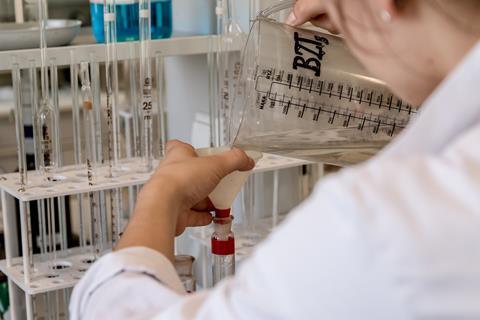Applied Microbiology International (AMI) has welcomed the EU Commission President’s recent mention of starting work on associating the UK to the €100bn (£88.6bn) Horizon Europe programme.
Members of the R&D sector in the UK have urged both sides to put renewed efforts into constructive dialogue to get association over the line, ending the impasse that has lasted over two years.
”Association will be of major importance to the scientific community, including AMI’s members, to enable international collaboration on research and innovation once again in order to continue tackling key global challenges,” said AMI chief executive Dr Lucy Harper.

Hopes had been raised that the UK’s R&D sector will benefit from the Horizon Europe programme after Rishi Sunak’s breakthrough deal with the EU over the post-Brexit Northern Ireland protocol.
Trade deal confusion
For more than two years, researchers in the UK have received little funding from the flagship EU programme because of the confusion over Brexit trade deal negotiations.
Not only have researchers been unable to apply for grants, but the impasse has affected the ability of UK researchers to collaborate with those in the EU and led to concerns that the UK is becoming a less attractive location for top European researchers and students.
The hope that the Windsor framework will pave the way for the UK to link up with Horizon Europe is shared by Ursula von der Leyen, the European Commission president, who described the deal with Sunak as “good news for scientists and researchers in the EU and in the UK”.
“The moment it’s implemented, I’m happy to start immediately – right now – work on an association agreement, which is the precondition to join Horizon Europe,” she said at a press conference announcing the accord.
However, there have since been reports that Prime Minister Rishi Sunak is sceptical about the value of the world’s largest research programme and the cost of British participation and intends to take stock of options including the country’s “plan B” global research plan.
Funding returned
In February, the Campaign for Science and Engineering (CaSE) revealed that Department of Business, Energy and Industrial Strategy (BEIS) had returned £1.6 Billion of funds to the Treasury, which had previously been allocated for Horizon Europe association or domestic alternatives.
Dr Mark Downs CBiol CSci FRSB, Chief Executive of the Royal Society of Biology, said: ”This is not simply returning unspent funds with no impact on the future. The reality is that £1.6bn of R&D funding, that could have benefitted UK science, has been lost.
“With new Government departments recently announced, that include a seat for science at the cabinet table, we urge the Government to deliver on the promise to protect historic R&D funding commitments by making this funding available to future programmes.”
Last month, the government announced that Professor Dame Angela McLean DBE FRS had been appointed as the new Government Chief Scientific Adviser (GCSA) following an open competition. Dame Angela, who is currently Chief Scientific Adviser for the Ministry of Defence, will take up the post on 1 April.
She is a Professor of Mathematical Biology in the Department of Zoology at Oxford University, and a Fellow of All Souls College. Her research interests lie in the use of mathematical models to aid our understanding of the evolution and spread of infectious agents.







No comments yet